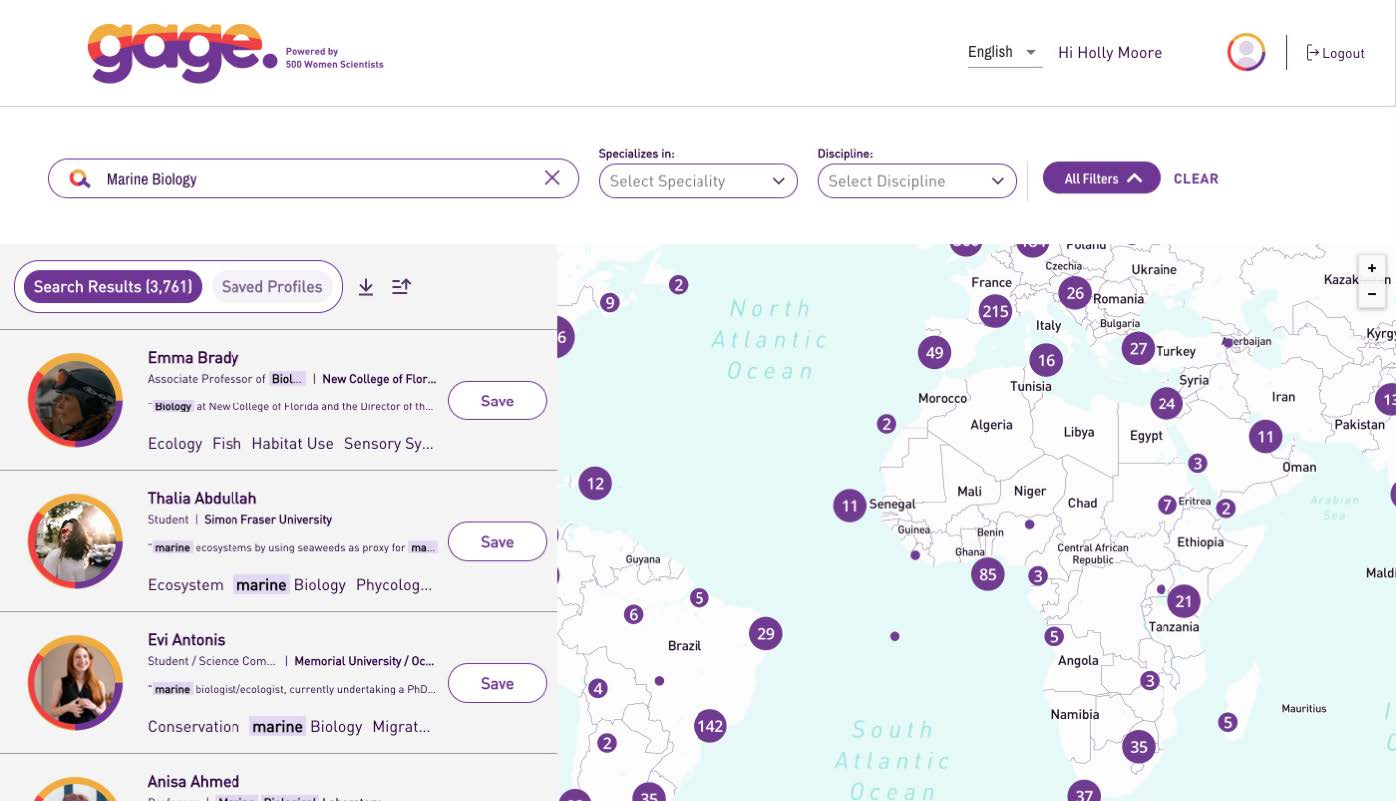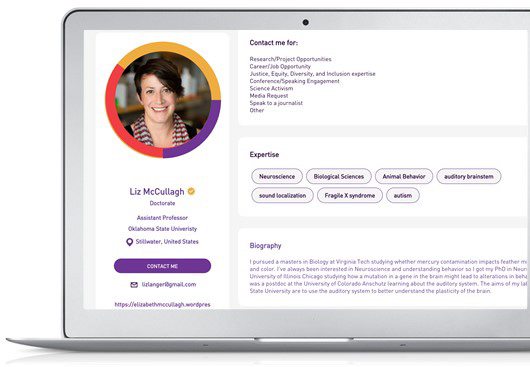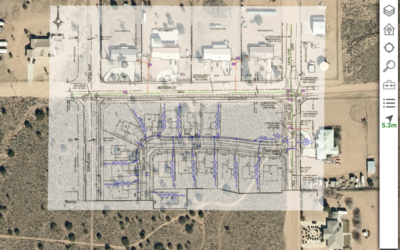500 Women Scientists launch Gage platform to connect people around the world using Locana open data and development services.
Customer
500 Women Scientists is a global community formed to serve society by making science open, inclusive, and accessible. Its fundamental mission is to build a means and community for women scientists to connect, learn, share, and grow. Formed by four women who met in graduate school, 500 Women Scientists started with the vision of science as a language to bridge divides and bring prosperity worldwide. Immediately following the November 2016 election, the group published an open letter re-affirming their commitment to advocate for science and marginalized communities in science. More than 20,000 women of science and supporters from more than 100 countries have pledged to support the organization’s efforts to build an inclusive scientific society dedicated to training a more diverse group of future leaders.
In partnership with Locana, 500 Women Scientists launched its global web search platform Gage. Built using open GIS technology, the site provides an intuitive, data-rich experience for anyone to perform a simple search and get instant results. It’s used by tens of thousands monthly, elevating the profiles of scientists, and helping connect people worldwide.
I noticed it was tough to find other women and minorities doing similar research. So why don’t we try to lift each other and create a platform that makes it more obvious who a scientist is and gives resources to connect with people doing science?”
DR. ELIZABETH MCCULLAGH
Assistant Professor, Oklahoma State University and co-Founder, Gage by 500 Women Scientists

Gage visitors can explore the world’s largest community of women and gender-diverse people in STEMM.
Challenge
The original idea for using technology to connect women of science began with a meeting over coffee.
Previously, co-founders and scientists Dr. Jane Zelikova and Dr. Elizabeth McCullagh had a conversation around the idea of building a database of women scientists. The goal was to make it easier for scientists to connect with others teaching, writing, and researching similar topics.
Zelikova also had a conversation with fellow co-founder and scientist Dr. Katarzyna Nowak. They expressed frustration at a lack of diversity represented at science conferences where all-male panels presented to attendees. As a result, a wealth of knowledge and expertise were left untapped because many women aren’t asked the same questions, whether during events, research, or other forums.
Serendipitously, both lived in the same city at the time—Fort Collins, CO. The two met over coffee to discuss the idea that would become the framework for a web service that would eventually be called Gage. They decided it should be map-based. The goal was to use geographic location as an essential tool in the search.
Challenges
- Limited search capabilities
- Rigid database functionality
- Few admin tools
- Poor customer experience
- Cost and rigidity of propriety solutions
Representing women scientists globally
The first iteration of the database consisted of a Google form to fill out questions and a Tableau front-end for the map-based directory. Known as the Request a Woman in STEMM directory, it was an immediate success with thousands signing up. But, as the numbers grew, it became apparent they would quickly outgrow this initial basic system.
An RFP was sent and Locana supplied a proposal response. Led by professional services director Kim Kearns, she outlined how her team, a group of women designers and developers, would deliver a quality solution with lasting value using geospatial technology.
Kearns submitted a portfolio of map-based projects, including other non-profit clients, leveraging geospatial technology, which, according to Dr. McCullagh, stood out from other respondents. After a thorough evaluation, Locana’s Open Data and Development (OD&D) services were selected. The goal was to make it as easy as possible to put information into the hands of users, providing a visual, geographic context for easy perusal. In addition, the application needed to be scalable and provide better administration tools for managing the database.
Solution
Locana collaborated with 500 Women Scientists to develop Gage, an application named after Matilda Gage, referring to the Matilda Effect, which is the tendency to overlook women’s roles, contributions, and achievements in scientific progress, innovation, and invention.
Locana built a secure backend database for the more than 14,000 members of 500 Women Scientists. In addition, Locana designed and implemented the public-facing landing page that provides rich information about Gage and 500 Women Scientists. They created the user experience (UX) and user interface (UI) to give the user a modern experience, as well as the administrative interface that provides the tools to perform several key activities. For example, tools are available to see which users have been vetted and not vetted, view analytics on engagement, and communicate on a one-to-one or one-to-many basis.
Building communities to foster real change
Locana also built another application, called Orca, that helps manage more than 500 “Pods” or local chapters of the organization around the world. Each Pod is a vital part of the organization and facilitates the grassroots localization of needs and priorities worldwide. Orca gives members the ability to self-organize and coordinate. Each Pod (geographic group) has a coordinator who is a Pod leader. Orca gives them the ability to use geospatial technology to access information and contact users to organize events, make requests, and more.
500 Women Scientists wants to be the Google of women in the science and medicine community. This involved building a secure application powered by a global database of women, often from countries where they are not allowed to talk about science. They wanted to provide a safe place for women scientists around the world to freely connect and communicate.”
KIM KEARNS
Director of Professional Services, Locana
Results
Launched in 2019, Gage successfully met its objectives to provide a fast, efficient resource that enables educators, policymakers, media, and others to quickly connect to the expertise of women and gender-diverse people in STEMM. Leveraging an open, scalable platform, 500 Women Scientists now empowers thousands of scientists worldwide to exchange knowledge and engage with each other and the public—from the U.S. to Brazil, Nigeria to Saudi Arabia, India, China, Australia, and beyond. And its innovative use of open geospatial technology provides a critical visualization and location-based tool to increase opportunities for marginalized communities.
“I love when new folks sign up to be a resource in the directory,” says McCullagh. “Every day we get new registrants and soon there really will be something for everyone.”

Member profile page
Discover brilliance
Visitors can browse what’s become the world’s largest community of women and gender-diverse people in STEMM to explore and discover directly. Members/scientists can also register to be contacted for speaking engagements, events, media requests, and research. The intuitive interface enables them to explore a global map to search a country or region. Keyword search functionality allows users to type in criteria, including location, discipline, area of interest, and expertise.
Gage also integrates with the Lifeology platform, which provides aesthetically pleasing, digitally illustrated, bite-sized “flashcards” featuring different scientists each month to inspire others.
On the back end, Gage members can provide rich detail about their professional expertise. For example, they can include their biography, field of science, and affiliated groups; past media experiences; area of expertise; languages and diversity (e.g., country of origin, race, and gender identity); and contact information.
Benefits
- Intuitive, modern UX and UI design
- Deeper search capabilities
- Simplified administrative tools
- Robust, scalable database tools and analytics
- Open-source flexibility, speed, and cost-effectiveness
Future
500 Women Scientists and Locana continue to partner on project initiatives. They are working to improve search capabilities by adding many more filters and returning results by relevancy rankings using embedded intelligence. Another goal is to provide contact capabilities for public site visitors without giving away personal information. Improvements in administrative tools, analytics, and email templates will extend the power and usability of the platform.
The long-term goal is that 500 Women Scientists becomes obsolete because everything is equitable for everyone. The short-term is to make everyone aware of Gage and use it. Make it a no-brainer to come here to contact someone in science, or even ask a question for anything related to science.”
DR. ELIZABETH MCCULLAGH
Assistant Professor, Oklahoma State University and co-Founder, Gage by 500 Women Scientists
Download the full case study here.


